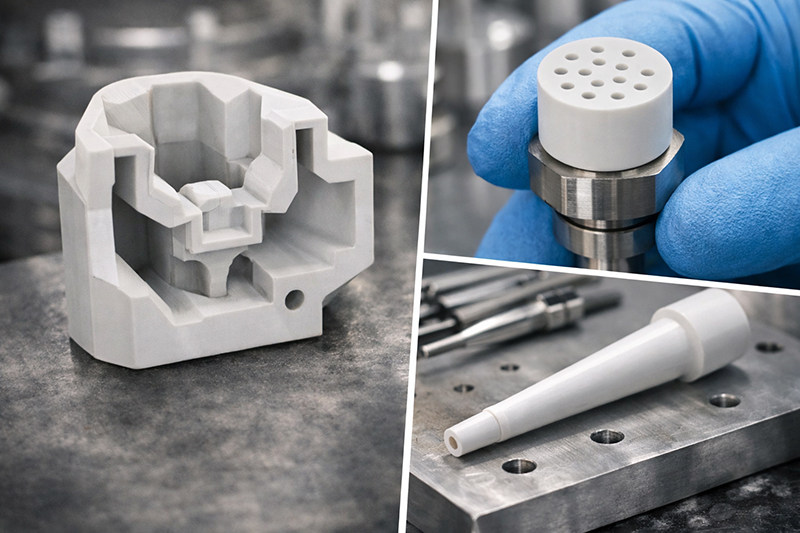An Introduction to Silicon Carbide Abrasives
Silicon carbide is an important ceramic material known for its excellent hardness. Its hardness is only surpassed by diamond, cubic boron nitride, and boron carbide. This compound is composed of silicon and carbon. It has very high abrasion resistance and is relatively cheaper when we talk about production. The material is lightweight, has excellent thermal conductivity, and has low thermal expansion. For these reasons, silicon carbide material is often applied as a loose or solid abrasive material in several applications. Silicon carbide ceramics maintain a high mechanical strength in temperatures as high as 2,550° F. It is capable of withstanding corrosion by chemicals much better than many other ceramic materials. Silicon carbide crude is produced by mixing and heating silica (SiO2) with carbon (C) in an adhesion graphite resistance furnace at very high temperatures. Silicon carbide abrasives are available in several forms, depending on the applications they're meant for. Before we look at these, let's quickly consider the different types of silicon carbide products.
Types of Silicon Carbide Ceramics
In commercial engineering applications, silicon carbide is produced in different forms.
- Sintered silicon carbide (SSC)
- Nitride bonded silicon carbide (NBSC)
- Reaction bonded silicon carbide (RBSC)
- Clay-bonded silicon carbide
- SiAlON bonded silicon carbide, also known as silicon nitride bonded silicon carbide (NBSC).
- Chemical-vapor-deposited silicon carbide (CVD) Silicon Carbide. CVD is an extremely pure form of silicon carbide compound.
Types of Silicon Carbide Abrasives
Silicon Carbide Powder
Silicon carbide powder is a commonly used abrasive material. Silicon carbide powder can be produced by reacting and pyrolyzing vaporized polysiloxanes in a single heating step, which produces silicon carbide powder. This process is straightforward and inexpensive. This method basically involves introducing a vaporized polysiloxane into a reaction chamber. The polysiloxane vapor is then made to react at a temperature of about 2900° F for a period of time sufficient to convert the polysiloxane vapor into silicon carbide powder, which is then collected.
![]()
Silicon Carbide Powder
Silicon carbide powders are particularly used as abrasive materials for abrasive machining processes such as grinding, water-jet cutting, and sandblasting. Silicon carbide powders serve as grinding powders for fine grinding or rough polishing semiconductors, ceramics, and ferrous materials. It can also be used for shaping, honing, and polishing other materials.
Silicon Carbide Sandpaper
Another common application of silicon carbide is in wet and dry sanding. This includes automotive polishing, as well as polishing stone and marble. In more coarse grits, the abrasive is ideal for removing rust, deburring metal and glass, refinishing wood flooring, etc.
![]()
Silicon Carbide Sandpaper Sheet
Silicon carbide sandpaper is actually the hardest and sharpest abrasive commonly used in many applications. However, it lacks durability due to its brittleness, and its narrow particle size wears down faster. The grains are razor-sharp, making them ideal for sanding metal, marble, glass, stone, cork, medium-density fiberboard, and plastic using minimal pressure application.
Silicon Carbide Grinding Wheel
Grinding wheels consist of abrasive compounds, which are used for various grinding and abrasive machining operations in grinding machines. Most grinding wheels are made with composite materials. Silicon carbide grinding wheel is another common application of the fast-cutting silicon carbide material. It is used for non-ferrous metals. It has very sharp abrasive grains and is typically recommended for grinding relatively soft metals like aluminum or cast iron. It can also be utilized for grinding extremely hard materials like cemented carbide. For instance, a green silicon carbide grinding wheel is a type of bonded abrasive that uses green silicon carbide grain materials and vitrified or resinoid bonds to form certain shapes. Green silicon carbide grinding wheels are mostly used on carbides. Black silicon carbide, on the other hand, is used for machining materials like stone, plastics, etc. These wheels can be run with or without coolant.
Silicon Carbide Sharpening Stone
A common application of silicon carbide sharpening stone is for the sharpening of knives made from hard stainless steel. Silicon carbide sharpening stone cuts aggressively. Usually, silicon carbide stones do come in a coarser grit and are suitable for the initial coarse sharpening. Silicon carbide stones have been shown to have a Mohs Hardness of 9-10. Silicon carbide sharpening stones can be used with either water or oil. Oil stones, for instance, can be made from different types of materials, which are novaculite, aluminum oxide, and silicon carbide, but the fastest cutting oil stones are silicon carbide stones. When using water with the stones, it helps to have some dish soap mixed with it, so it doesn’t just soak into the pores immediately.
Conclusion
Silicon carbide is a ceramic material containing silicon and carbon. The material is hard, containing abrasive grains that break down under pressure, and is used in many essential applications, such as sandpapers, grinding wheels, and sharpening stones. Thank you for reading our article and we hope that it can help you have a better understanding of silicon carbide ceramics. For more information, please visit https://www.preciseceramic.com/.
{{item.content}}
LEVE A REPLY
{{item.children[0].content}}
{{item.content}}
LEAVE A REPLY
SUBSCRIBE OUR NEWSLETTER
- How PBN Crucibles Ensure the Quality of GaN & SiC Epitaxial Materials
- SiC vs. Quartz Focus Rings: A Cost and Performance Analysis for Advanced Etch
- AlN Ceramic Substrates: Enabling Next-Gen Electrostatic Chucks
- The Amor of Semiconductor Tools: Why High-Purity Al2O3 & AlN Are Preferred for Plasma Process Chambers
- Silicon Carbide - Ultra-High Temperature Ceramics for Extreme Environments










